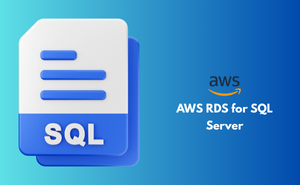👇 CELEBRATE CLOUD SECURITY DAY 👇
00
HOURS
00
MINUTES
00
SECONDS

AWS RDS for SQL Server allows you to use Microsoft SQL Server in the cloud without needing to worry about setting up servers or doing technical maintenance. Amazon manages the database for you, handling tasks like security patches, backups, and performance tuning. This makes it easier and faster to get a database running.
It’s especially helpful for companies that rely on large amounts of data and want a hassle-free way to manage it. Whether you're tracking inventory, storing customer info, or running business reports, AWS RDS gives you a reliable and scalable solution—all accessible online with minimal setup.
This exam is ideal for:
Domain 1 - Introduction to AWS RDS
Domain 2 - Getting Started with SQL Server on RDS
Domain 3 - Security and Access Control
Domain 4 - Backup, Recovery, and Maintenance
Domain 5 - Performance Monitoring and Optimization
Domain 6 - High Availability and Disaster Recovery
Domain 7 - Migration Strategies
Domain 8 - Cost and Scaling
Industry-endorsed certificates to strengthen your career profile.
Start learning immediately with digital materials, no delays.
Practice until you’re fully confident, at no additional charge.
Study anytime, anywhere, on laptop, tablet, or smartphone.
Courses and practice exams developed by qualified professionals.
Support available round the clock whenever you need help.
Easy-to-follow content with practice exams and assessments.
Join a global community of professionals advancing their skills.
(Based on 1050 reviews)
Yes. You’ll explore encryption, IAM roles, network security, backups, multi-AZ deployment, and high availability.
Definitely. Understanding RDS integration with SQL Server enhances your capability to manage hybrid cloud architectures.
Roles include Cloud Database Engineer, AWS Database Administrator, SQL Server Cloud Architect, and DevOps Engineer with database focus.
Yes. It’s used by enterprises and startups alike for running relational databases with minimal infrastructure management.
Yes. Topics often include strategies for migrating on-prem SQL Server databases to RDS using AWS DMS and other tools.
Finance, healthcare, e-commerce, education, logistics, and any data-driven sector relying on Microsoft SQL Server.
You’ll learn how to provision, configure, secure, back up, monitor, and optimize SQL Server databases on AWS RDS.
It proves your ability to handle database administration in cloud environments — a critical and growing requirement across industries.
It’s a managed database service by Amazon Web Services that allows users to run Microsoft SQL Server in the cloud with high availability, scalability, and reduced administrative overhead.
Database administrators, cloud engineers, IT professionals, and developers who work with SQL Server and want to migrate or manage it on AWS.
Yes. You’ll learn how to automate tasks like backups, scaling, and monitoring using AWS CLI, CloudWatch, and Lambda.
RDS is fully managed — AWS handles patching, backups, and failover, freeing you from administrative burdens.
Yes, basic knowledge of SQL Server (queries, tables, backups) is recommended to fully benefit from the course.
It’s better suited for those with some cloud or database experience, but motivated beginners can follow along with guided learning.
Very. As businesses continue to shift to cloud-native solutions, skills in managed services like RDS are in high demand globally.